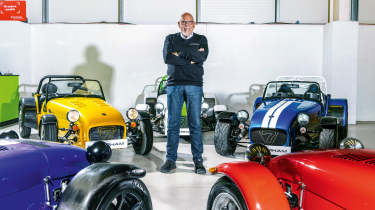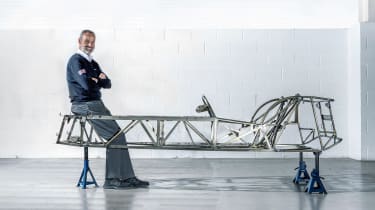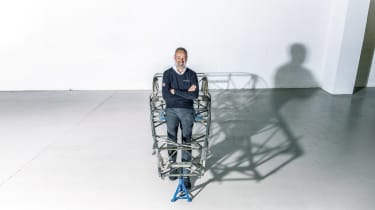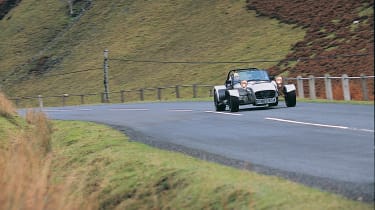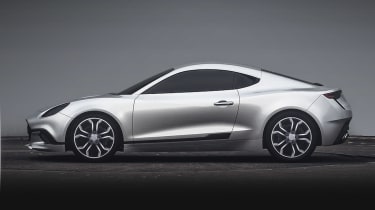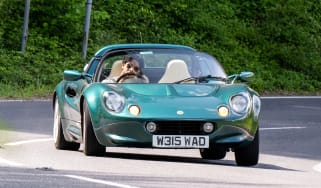Caterham’s future sports car plans – will it go electric?
What does the future hold for the UK’s specialist car makers like Caterham? We’ve been finding out
There are challenging times ahead for all car makers, especially for small sports car manufacturers like Caterham. In early 2021, the UK government confirmed that it would ban the sale of petrol- and diesel-engined new cars in 2030. Other governments around the world have announced similar plans with deadlines a few years later. Some large-volume car makers have announced the end of internal combustion engine (ICE) development, others that their range will be entirely BEV (battery electric vehicle) within a few years. But what will low-volume, specialist car makers do?
There’s an argument that the environmental impact of the ICE cars of all specialist car makers combined is so small as to be indiscernible, another that the future of personal transport should logically contain a number of low-emission solutions alongside BEV, perhaps allowing hydrogen fuel cells and ICE running on carbon-neutral fuels. However, at present the plans of the UK government include no such options and no dispensations.
> Caterham EV Seven previews all-electric sports car
For makers of super-lightweight cars that engage the driver with agile dynamics, characterful engines and manual gearboxes, going all-electric and adding a hefty battery pack seems to run contrary to their very reason for being. Also, while volume car makers can pivot large research and development budgets from ICE to BEV, how will specialists fund the shift? And even if they can fund it, what are they going to build? What is their ten-year plan?
Of all the UK’s specialist car makers, Caterham Cars would seem to be one of the most at risk from the impending legislation. The Dartford-based company has been building the super-light Seven since 1973, though the car was originally put into production by Lotus way back in 1957. Its extraordinarily long life can be attributed to the genius of Colin Chapman’s original design and Caterham’s ceaseless but careful development of it.
The Seven’s simplicity, small scale, lightness and balance of masses – including its internal combustion engine – give excellent, exploitable and intuitive handling. Caterham is attempting to replicate this with the newly announced EV Seven concept, which weighs just 70kg more than an ICE model, but it'll also develop a new EV sports car that embraces the company’s core values and appeals to a new generation of customers not wedded to the internal combustion engine.
Last April, Caterham was bought by VT Holdings, a Japanese company that runs hundreds of car dealerships, mostly in Japan, where it has been Caterham’s importer since 2009. The acquisition brought to an end a tricky decade under Malaysian entrepreneur Tony Fernandes, and a couple of financially tough, Covid-blighted years.
‘VT’s ownership has been fantastic from where I sit,’ says Graham Macdonald, Caterham’s CEO, who has been running the company since 2012. ‘In Fernandes we had an owner who pretty much lost interest in Caterham after the F1 and the Alpine experience debacles.’ Under Fernandes, Caterham Racing enjoyed a short, unsuccessful stint as a Formula 1 constructor, failing to gain a single championship point. It also created Caterham Technology and Innovation (CTI), which set up base in Norfolk and jointly designed a sports car with Renault before bailing out when the time came to pay for expensive tooling. Renault finished the job and brought the brilliant Alpine A110 to market.
If it wasn’t for Macdonald, Caterham Cars might not be here today at all. ‘Tony was desperate to merge us with F1 and CTI. I fought tooth and nail to avoid that because I had this premonition that they weren’t going to work out through lack of funding, and I was proven right.
‘Post Tony, it was hand-to-mouth. We had to develop the Seven as best we could on limited funds, but here we are. We’ve got a 12-month order book, admittedly for ICE Sevens, but we’re part of this highly profitable, multinational, multi-billion-yen business, with an owner who loves the brand and is keen to see us succeed in the future.’
VT has stabilised the company financially and is backing it to produce a Caterham EV, bringing in Bob Laishley as chief technical officer to oversee technical matters and guide the EV project. Laishley was with Nissan for 11 years, his last role being programme director with responsibility for OEM (original equipment manufacturers) and sports cars. He knew VT through the many Nissan dealerships the company has in Japan and was looking to retire but was persuaded by Kazuho Takahashi, VT’s chief executive, to take the role at Caterham. Takahashi is a proper car enthusiast and an accomplished racer who has competed in the Super GT and JGTC series.
‘The first thing to say is that we haven’t got any plans to kill off the Seven,’ says Laishley. ‘We want to make it for as long as we can keep it compliant with an ICE engine and I don’t think we should be ashamed of that. There is no organic demand for an EV Seven, so we want to try and generate a market for an EV Caterham, a product that will be built on Caterham’s core values: light weight, simplicity, fun to drive.’
Laishley acknowledges that there are significant hurdles to making such a vehicle. Currently, lightweight EV is an oxymoron, as is trackday EV, but he recognises that an EV Caterham needs to be both to be a true Caterham. There’s also the problem that Caterham will want the smallest, lightest EV technology – which will be the most expensive – for a car that will occupy a similar place in the EV market to the Seven in today’s ICE market.
‘I think there is room for a very simple, lightweight EV that’s true to our core values,’ says Laishley. By lightweight he means an EV that weighs less than 1000kg, so lightweight in the EV landscape. The project is still in the very early stages, and while this new model will look ‘more like a traditional vehicle’, it has not been decided if it will be a coupe or roadster, a two-seater or a two-plus-two.
In the past, new Caterhams that aren’t Sevens have struggled to catch on. The Caterham 21, based on the Seven chassis but with full bodywork, sold fewer than 50 examples. The CSR, a wide-body, aerodynamic Seven (another oxymoron candidate) with a revised spaceframe and suspension by Multimatic, sold in modest numbers. The difference this time, says Macdonald, is that the new car will be appealing to a new type of customer.
‘I think there is a new breed of enthusiast driver and thrill-seeker coming through, one who recognises the performance and dynamic advantages of lightweight construction. They’re youngsters who don’t know anything about engines, don’t want to fiddle under the bonnet, just want to feel the power and go fast with good handling.
‘That’s the market we want to capture. I think it’s totally different to our existing Seven owners. Don’t get me wrong, I’d love for them to come along on the journey but I think they’ll stick with their Sevens as long as they can.’
Although Caterham came away with nothing physical from the joint project with Renault, critical acclaim for the A110 gives Macdonald encouragement and confidence for the new car. ‘The area that the Alpine continues to get praised for is its light weight, its nimbleness, its handling characteristics, and those are the areas that my team were responsible for. We were badgering Renault all the time to keep the weight down. So I know, as a business, we have that background and we’re able to stick to our targets.’
Laishley has been in touch with many OEMs in the last ten months regarding EV technology, many of whom he did business with while he was at Nissan, and he has been encouraged by the response. ‘I’ve spoken to probably 20 potential technology partners. Every one is excited about the prospect of a lightweight, fun-to-drive sports car. They don’t see us as a competitor and they see that there’s a story, a journey to be had here, moving the narrative on from “EVs are boring and heavy”.
‘Some of the discussions are quite bizarre. They ask: “What regen braking do you want? What power steering system? What stability programs?” They’re a bit shocked when I say I just want an electric motor and a drivetrain that drives the wheels, and if a human being can’t handle the torque we’ll discuss traction control.’
While everything is heavy and expensive today, Laishley is confident it will evolve quickly and get lighter every year. Timing will be crucial, he says. ‘We need to start this journey, we need to start to shape the product, but I want to leave the choice of technology partners for as long as we possibly can, so that we get the best that is available at that point in time.’ It helps that there’s big demand for the Seven, which will keep VT happy. ‘I think sports cars will be the last thing that moves towards being an EV, so we do have time.’
Even if there was to be a late reprieve for the internal combustion engine, a late dispensation from the government for small-volume car makers like Caterham, Macdonald doesn’t think it would help. ‘All the OEMs we have deals with, they’re all phasing out their internal combustion engines. Ford have stopped the Sigma; the Duratec has got a finite life.
‘Even if we want to build internal combustion cars, even if we’re allowed to, the options available to us just get slimmer and slimmer. For now, the Seven is not going anywhere; as long as we’re allowed to produce them, we’ll be producing them.’
For Caterham, VT Holdings has arrived at just the right time. ‘I’m really hopeful that we will come out with a Caterham that fits into the EV market,’ says Macdonald. ‘Something that’s not too expensive but replicates the Seven characteristics of driving and handling and light weight, as far as you can with a BEV.’ Here’s hoping!

